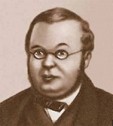Pyotr Yershov

Pyotr Pavlovich Yershov (Russian: Пётр Павлович Ершов; March 6, 1815 – August 30, 1869) was a Russian poet and author of the famous fairy-tale poem The Little Humpbacked Horse (Konyok-Gorbunok).
Pyotr Yershov was born in the village of Bezrukovo, near the town of Ishim, Tobolsk gubernia (currently Tyumen oblast). During his childhood he lived in the town of Beryozov. From 1827 to 1831, he studied in Tobolsk gymnasium, where he reportedly created a society for the Ethnographic study of Siberia and even planned to publish their own scientific journal. From 1831 to 1836, he studied philosophy at Saint Petersburg University, which was where he wrote his masterpiece, the fairy tale The Humpbacked Horse. A large extract from it was published in 1834 and brought Yershov instant fame. Alexander Pushkin wrote that Yershov was as fully in command of his verses as a landowner is in command of his serfs. Pushkin also announced that he would stop writing fairy tales as Yershov did it much better. Nonetheless, Pushkin did write The Tale of the Fisherman and the Fish one year after this announcement.
In 1836, Yershov returned to Tobolsk, where he worked as a teacher at the Tobolsk gymnasium. He became the principal of the school is 1858. He died in 1869 in Tobolsk. Biographers of Yershov note that disasters frequented his life. In 1834, just after the triumph of The Humpbacked Horse, both Pyotr's father and brother died within a few days. In 1838 his mother died; in 1845 his wife died; in 1847 he married again, but his second wife died in 1852. Of his 15 children only six survived.
Yershov published many lyrical verses, a drama called Suvorov and a Station Master, and several short stories, but none of these had the same success as The Humpbacked Horse. He also reportedly wrote a large fairy tale poem called Ilya Muromets, and a huge poem called Ivan Tsarevitch in ten volumes and one hundred songs, but subsequently destroyed them. Only a short extract from Ivan Tsarevitch survived.
 čeština
čeština Deutsch
Deutsch français
français magyar
magyar polski
polski русский
русский English
English Azərbaycan
Azərbaycan беларуская
беларуская italiano
italiano ქართული
ქართული Nederlands
Nederlands português
português slovenčina
slovenčina español
español 中文
中文 қазақ
қазақ







